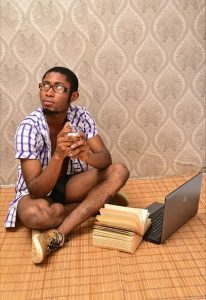Chibuihe-Light Obi is a Nigerian with two haikus on the #Babishai2016 Babishai Haiku shortlist. He defines haiku as the freezing of moments, while at the same time defining himself as a failed painter and amateur photographer.
Courtesy photo provided by Chibuihe-Light Obi
How do you define Haiku?
I cannot define haiku successfully without thinking of photography -the freezing of moments, movements and time; without thinking of precision. Haiku for me is a gasp that comes well after I’ve seen a mind blowing sight. Say a hill draped in mist. Or a gecko circling a moth. Or an ixora waltzing away in the wind. Much more, how the soul reacts to these spiritual experiences. Haiku is how the mind absorbs the after taste of a sublime sight or situation. It is pause and ponder. It is yoga. Introspection. Meditation. Stand still and see. Folding silence into a song so small you could scrawl it on your palms and tuck it away in your pockets for future use. Haiku is the only way silence or a sigh could be written without ruffling or bruising it.
What is the process of haiku writing like for you?
I am a failed painter and an amateur photographer. In between, I’m a carrier of a very porous imagination. Images stay in my mind, grow, change, metamorphose, until they threaten to spill over in some not/so/funny ways. So haiku is my own way of unwinding, of releasing these images. A means of securing space for them, giving them a chance to thrive. To be. To exist. Often times, my haiku come upon me suddenly, then I scrawl them on anything and forget or gather them up later. In editing, I pay intimate attention to depth, juxtaposition, sound or echo and how the images align with my soul. The last process, well, is shutting my eyes and rereading them over and over again. If I don’t hear and see it -both equally- it ain’t haiku yet.
Were you surprised at being shortlisted?
Actually, it still feels surreal. I just found Haiku less than six months ago, and some friends so far have told me that I don’t know how to do it. This is the first competition I have entered by myself; other ones were done on my behalf. It’s surprising, and that makes it electrifying.
Do you spend a lot of time reading Haikus, and from where?
Since February, which was when I discovered haiku, I try my best to visit a hiaku website at least every morning. I bookmark the websites and downloaded as much as I can. It has so far become a devotion. A way to wake, to unwind, to relax. My own zen. Places I go include: The Heron’s nest. Haiku for People, Frog’s Pond, Adjei Agyei-Baah’s Facebook page. The internet is so free and borderless; break it if you can.
Which African Haiku writers do you know and admire?
God! This may be shameful. But it’s only Adjei Agyei-Baah and I met him on The Heron’s Nest. Nevertheless, Babishaiku has introduced me to Kwaku Feni Adow, Blessmond and Ayesha. Now, the horizon has expanded.
Have you heard of the mamba Journal, a publication of Haikus, produced by the African Haiku Network, co-founded by one of our judges, Adjei Agyei-Baah?
Yes. I heard of the mamba journal on Facebook, Adjei’s wall to be precise. I even shared it in class with my students who before then did not know the word “Haiku”, let alone reading one.
How do you feel we should promote African haikus?
The Babishaiku prize is a good way to begin. The African Haiku Network is another splendid way of promoting haiku in Africa. Poets too should explore this genre of poetry, share their works online, collect them into anthologies and make all the necessary noise.
Any parting remarks?
Thank you Babishaiku for initiating this idea, for dragging me out of my cocoon. It is a juicy bait to lure poets in Africa towards the haiku art form. I am sure this will go a long way in pushing African Haiku to the fore. Hello to Kwaku, Blessmond and Ayesha. It’s nice having you here.
Thank you Chibuihe.
The #Babishai2016 Poetry Festival runs from 24-26 August in Kampala at Maria’s Place, opposite Froebel near Shell Petrol Station.

